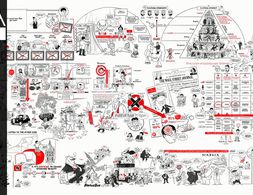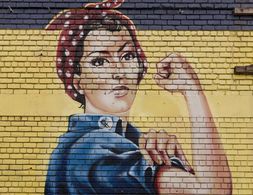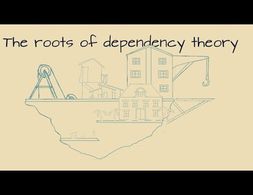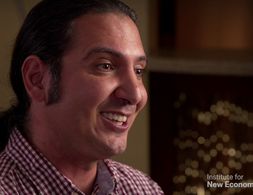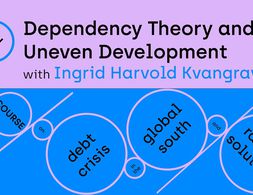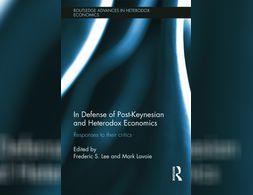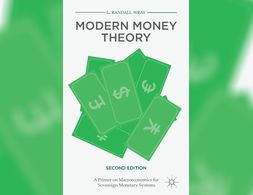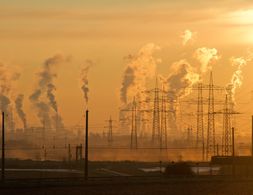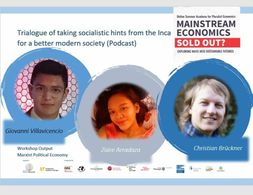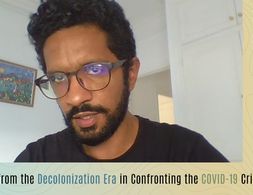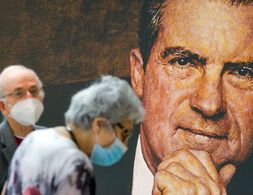✕
315 results
Paul Mason presents the main arguments of his book PostCapitalism. First, he argues that capitalism runs out of its capability to adapt to crises and second states that information technology challenges the capitalist system. In a nutshell, he argues that a society which fully exploits information technologies can't include concepts such as intellectual property, free market or private ownership. This has far-reaching consequences for the organisation of wages and work. The talk stops at minute 37.30.
This video animates part of the talk “On Economics” by Ha-Joon Chang in which he states that economics is not a science for experts but for everyone. Chang further argues why it is important to take into account different perspectives on economics – he identifies at least nine school of thoughts which all have their strengths and weaknesses and presents examples on free trade and well-being. Chang further elaborates on the difficulties of changing the economic status quo.
This text provides an overview of feminist perspectives on various kinds of work and reproductive labour. The authors start at the intersection of Marxism and Feminism. They, then, give a historical background on the United States feminist movement. They, finally, provide alternative perspectives on work and reproductive labor that are not based on Marxist Feminist theory.
On July 2020 ZOE-Institute published a unique platform for transformative policymaking: Sustainable Prosperity. Building on insights from new economic thinking the platform provides knowledge about ideas, arguments and procedures that support effective promotion of political change. It aims to strengthen change makers in public policy institutions, who are working on an ambitious green and just transition. As such, it provides convincing arguments and policy ideas to overcome the reliance of economic policy on GDP growth
Developmental economics
This short video examining the concepts of rents and rent-seeking, and the high cost of orthodox liberal anticorruption policies.
Economists claim they are not biased or ideological, but research by economist Mohsen Javdani tells another story. Javdani discovered that 82% of economists claim that statements and arguments should be evaluated on the content only, but the results of the study show the exact opposite.
The author discusses the various dimensions of the recent hike in inflation in the context of the United States and policy dilemmas around high inflation GDP decline and unemployment Servaas Storm Institute for New Economic Thinking
A detailed introduction into dependency theory that rethinks its relevance to modern development challenges.
The podcast discusses how to deal with the rising inflation and presents a comparative perspective between the US and the EMU. Basically the speakers discuss whether we are heading to a stagflation in Europe similar to the 1970s and they compare the macroeconomic dynamics in the United States vs. the EMU.
Trade disputes are usually understood as conflicts between countries with competing national interests, but as Matthew C. Klein and Michael Pettis show in this book, they are often the unexpected result of domestic political choices to serve the interests of the rich at the expense of workers and ordinary retirees.
Post-Keynesian and heterodox economics challenge the mainstream economics theories that dominate the teaching at universities and government economic policies. And it was these latter theories that helped to cause the great depression the United States and the rest of the world is in.
In a challenge to conventional views on modern monetary and fiscal policy, this book presents a coherent analysis of how money is created, how it functions in global exchange rate regimes, and how the mystification of the nature of money has constrained governments, and prevented states from acting in the public interest.
Prof. Robert Guttmann looks at the current transformation of the international world order through the lenses of global money and finance.
Quinn Slobodian a historian of modern Germany and international history analysis of current development in the Mont Pèlerin Society and therefore neo-liberalism. He sees neo-liberalist thinkers less as believers in the self-healing power of markets, but more as ordo-liberal Globalists who wanted to protect the markets from post-war politics and especially mass democracy. Their goal of global capitalism is still strong, however sceptics in the Mont Pèlerin Society are rising, which see international migration as a threat to Globalisation. Therefore, turning neo-liberal policies away from international institutions like the EU back towards the national states as new defenders of the markets as well as international trade and investments.
(A development which can be seen in the Friedrich A. von Hayek-Gesellschaft and especially in the "liberal" wing of the German rightwing populist party AfD)
Understanding international trade is central to economics and is currently a hot political issue. It’s an area where popular perceptions of mainstream economics are low, since they have historically missed some important downsides of trade agreements, especially the hollowing out of former manufacturing hubs in the Western world. et economists have for long time had a theory of trade with an impressive amount of scientific clout behind it: the gravity trade model.
Economists like to base their theories on individual decision making. Individuals, the idea goes, have their own interests and preferences, and if we don’t include these in our theory we can’t be sure how people will react to changes in their economic circumstances and policy. While there may be social influences, in an important sense the buck stops with individuals. Understanding how individuals process information to come to decisions about their health, wealth and happiness is crucial. You can count me as someone who thinks that on the whole, this is quite a sensible view.
The effects of the 2020 pandemic on the Latin-American region: a thorough before-after analysis.
In this short podcast, Naomi Fowler, the Tax Justice Network's creative strategist, discusses how the laws made by those who profited from slavery and the empire and, the extractive business models of the major financial sector continue to impoverish some of the poorest nations.
A remarkable and insightful tribute into the works of late Malawian development economist, Professor Thandika Mkandawire. Must read for anyone looking to broaden their scope of understanding development as it relates to the African continent.
Industrial policy has been a central part of policy prescription by many heterodox schools arguably since mercantilism, but the theories behind it and types of policy advocated for have evolved over time. Recently some neoclassical economists have shown renewed interest in it, but is this mainstream acceptance a step back or a step forward from earlier heterodox ideas?
The workshop introduces into the field of critical political economy and tries to identify the role of finacial markets in capitalism, the reason for financial crises and the relevance of Marx in regard to these topics.
In this webinar for the Princeton Bendheim Center for Finance, Nobel Prize winner William Nordhaus explains the main problems regarding the economics of a low-carbon energy transition.
The Trialogue is a podcast about combining historic ideas of the high-culture of the Inca and modern problems. The three authors each put their own perspectives of the topic and show insights into their actual view of economics.
The Nobel laureate Amartya Sen´s text analyzes three main figures in social sciences and the relation between them: the Italian economist Piero Sraffa, the Austrian philosopher Ludwig Wittgenstein, and the Italian politician and philosopher Antonio Gramsci.
After completing the module, participants should be able to analyse the concepts of degrowth, ecological unequal exchange, Green New Deal, and embeddedness by applying theories situated within the fields of academic research of Ecological Economics and Political Ecology.
Post-Colonialisms Today researcher Chafik Ben Rouine looks to Tunisia’s post-independence central banking method to provide insight on what progressive monetary policy can look like.
Florian Kern replies to Zoltan Pozsar's analysis about the effects of the war in Ukraine on the global financial order and refutes the latter's prognosis of the demise of the US dollar as the world's reserve currency
"Yuliya Yurchenko is a senior lecturer and researcher in political economy at University of Greenwich. She is currently in Ukraine on an extraordinary leave. And while she writes that she is, for the moment, in relative safety, that could change any moment. Being a Ukrainian, an activist and an academic, Yuliya traveled to Ukraine on Feb 19, 2022 as part of a fact-finding and solidarity mission with a number of MPs, trade unionists and journalists. The goal, she says, of this mission is to connect with civil society organizations, trade unions, activists and politicians, and “to express direct, cross-border solidarity from the UK working class to the Ukrainian working class.”
To what extent does gender affect people's patterns of labor force participation, educational preparation for work, occupations, hours of work (paid and unpaid) and earnings?
The piece describes some of the effects that Nixon's decision to delink the dollar from gold in the 1970s had for the relationship between the IMF and its member states. A focus is on the negative effects of this change on societies in the Global South.
Why did inflation lift of in 2022? Are there differences between the US and the Eurozone and if so, what are they?
We use cookies on our website. Click on Accept to help us to make Exploring Economics constantly better!


